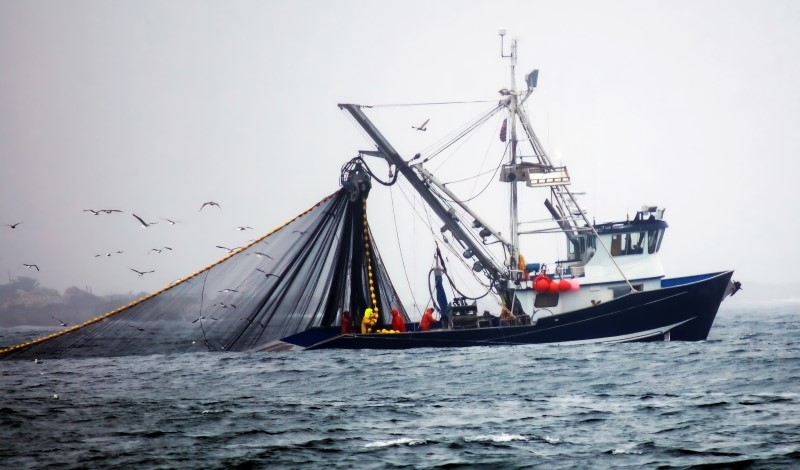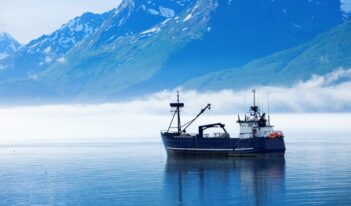
Internationally, regulators grapple with illegal fishing’s role in ecological degradation, drug trafficking, and forced labor.
In the last 50 years, a robust black market has developed on the open seas. On international waters, safe from the reach of domestic law enforcement, commercial vessels engaged in unlawful fishing have slowly become entangled in drug smuggling, organized crime, and even human trafficking.
Globally, around 3.3 billion people rely on seafood as an essential part of their diet. As the fishing industry has raced to meet global demand, coastal fish populations have declined sharply. That scarcity has forced commercial fishers farther out to sea, where it is practically impossible for countries to enforce fishing regulations or criminal laws. This lack of control allows vessels to engage in illegal, unauthorized, and unregulated fishing (IUUF) undeterred.
The economic impacts of IUUF are staggering. One group of researchers estimates that about 15 percent of all oceanic catch is unlawful. Other experts estimate that in Mexico, nearly half of all oceanic fishing may be unauthorized. Yet, another study showed that in South America alone, IUUF causes annual economic losses of up to $2.3 billion.
IUUF vessels are also hotbeds of worker abuse. Away from the oversight of law enforcement, IUUF vessels frequently turn to forced labor to save money. Human rights activists claim, for example, that the Thai fishing industry—which supplies roughly 2 percent of the global seafood output— likely would collapse without slave labor. One group of experts found that as much as one quarter of commercial fishing vessels are at high risk of similar labor abuses. And because some ships transfer their catch to other vessels rather than returning to port, workers can suffer years of abuse with little hope of escape.
In Latin America, the illicit fishing industry has increasingly attracted the attention of organized criminal networks. In some cases, cartels have taken over entire fishing villages. They have even begun to intimidate seafood processors and purveyors into laundering and selling their illegal catch, putting cartels in effective control of whole seafood supply chains, some of which extend into the United States.
Cartel interactions with Chinese IUUF leads to other forms of illicit trade as well. For example, one U.S.-led operation in 2020 revealed that unauthorized Chinese fishing vessels were also smuggling drugs, diamonds, and precious metals from Latin America to China. In exchange, the Chinese vessels bring the cartels materials necessary for fentanyl and methamphetamine production.
IUUF also drives overfishing, which some commentators consider one of the greatest environmental and economic issues facing humanity. Oceanic fish are difficult to protect because they do not stay within national boundaries, making international cooperation essential. Data show that many of the oceanic fisheries currently at risk of collapse from overfishing could recover in less than a decade with appropriate collective action. But just one non-compliant country could delay recovery, making a unified regulatory approach essential.
In this week’s Saturday Seminar, scholars shed light on the unique ecological, humanitarian, and economic consequences of IUUF.
- The difficulty of regulating fishing vessels on the high seas enables these vessels to engage not only in IUUF, but also drug smuggling and human trafficking, Caitlin Keating-Bitonti of the Congressional Research Service explains in a statement before the U.S. Congress. According to Keating-Bitonti, the U.S. Coast Guard, the lead U.S. enforcer of maritime resource laws on the high seas, uses several strategies to counter IUU fishing and boost national security. For example, Coast Guard patrols may investigate suspected vessels, board vessels randomly to deter unlawful practices, or report a suspected vessel to the nation whose flag it flies. The Coast Guard also analyzes vessel movement patterns for suspicious activity that may indicate IUUF, Keating-Bitonti reports.
- In a recent policy brief issued by the Mercatus Center, Bradley Soule and Christine McDaniel argue that a recent World Trade Organization agreement on IUUF has loopholes that could lessen its effectiveness. Soule and McDaniel explain that the agreement is meant to end government subsidies for vessels that engage in IUUF or access overfished stocks. But the authors point out that the agreement does not require signatories to investigate suspected vessels or to impose meaningful penalties for violations. In addition, the agreement, as worded, only requires signatories to impose penalties once a given fish stock is at risk of collapse, they explain. Soule and McDaniel conclude that the agreement’s effectiveness will depend on the commitment of individual signatories.
- In a working paper issued by the Center for Latin American and Latino Studies at American University, Matthew Taylor and several coauthors examine the human impact of IUUF in South America. They find that up to 15 percent of the annual catch is harvested illegally, leading to food insecurity. IUUF also adversely impacts ecological tourism, causing further economic loss, the Taylor team explains. They also highlight several crimes associated with IUUF, such as forced migrant labor, verbal and mental abuse of workers, and human, weapons, and drug trafficking. The Taylor team explains that local regulations meant to address these problems often fail to reach the foreign vessels causing the most harm, instead burdening small local fishers.
- In a recent piece issued by the Brookings Institution, US. Coast Guard Commander James W. Ellsworth argues that international policymakers may finally be on the verge of a breakthrough in limiting IUUF. Commander Ellsworth notes that IUUF has received substantial attention from commentators and U.S. regulators in the last several years. Although he acknowledges that progress limiting IUUF has been somewhat limited, Commander Ellsworth argues that recent changes in the law could provide the tools regulators need to make substantial progress. In addition, Command Ellsworth notes that China—the world’s largest producer and consumer of seafood—has also recently taken steps toward limiting IUUF. He concludes that these steps and recent efforts to improve surveillance on the oceans could greatly lessen IUUF.
- Customs and Border Control and the National Marine Fisheries Service (NMFS) must work together to best prevent illegal fishing, according to a Government Accountability Office (GAO) report. Currently, both the NMFS and Border Patrol work to prevent illegal fishing and importation, but the two offices do not share information, GAO observes. By sharing information, both NMFS and Border Patrol could better prevent illegal fishing by detecting more illegal operations, GAO argues.
- In an article in Ocean and Coastal Management, Kathleen Auld of the World Maritime University and others discuss the need for an international approach to preventing illegal fishing. Auld and coauthers observe that, currently, illegal fishing poses a significant threat to international ecological recovery goals, but haphazard local regulations fail to address the scope of the program. They conclude that empowering an international, joint body with creating anti-illegal fishing programs could better address the problem.
The Saturday Seminar is a weekly feature that aims to put into written form the kind of content that would be conveyed in a live seminar involving regulatory experts. Each week, The Regulatory Review publishes a brief overview of a selected regulatory topic and then distills recent research and scholarly writing on that topic.



